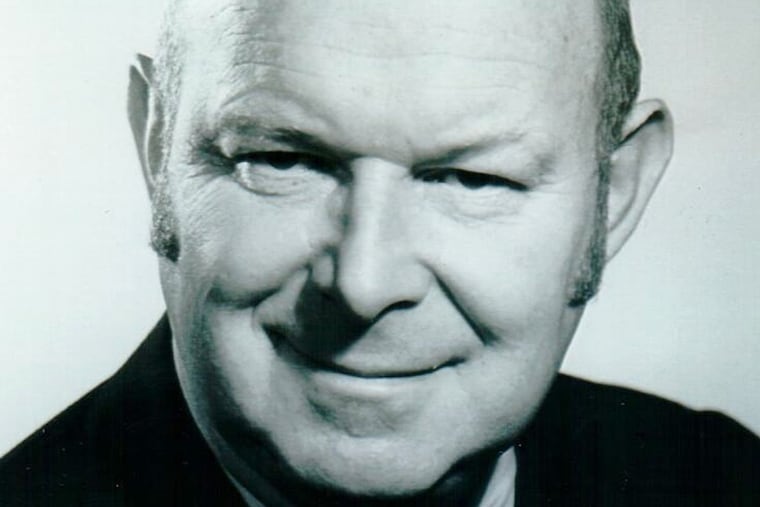H. Keith Mosley, 91, Temple official, decorated WWII veteran
Services are planned for Jan. 9 for H. Keith Mosley, 91, of Jenkintown, a decorated World War II veteran and former prisoner of war who later pursued a career in public relations and development.

Services are planned for Jan. 9 for H. Keith Mosley, 91, of Jenkintown, a decorated World War II veteran and former prisoner of war who later pursued a career in public relations and development.
Mr. Mosley, a 1968 transplant to the Philadelphia area from New York state, died Thursday, Nov. 26, at Abington Hospice in Warminster of complications from a fall.
Known to family as "Mose," Mr. Mosley spent his childhood in Arcade, N.Y. He attended Oberlin College before enlisting in the Army Air Force in 1943.
Trained as an aerial gunner, Mr. Mosley flew 29 missions without incident on a B-24 Liberator out of England. On Nov. 26, 1944, during his 30th mission, just before he was to have rotated back to the United States, his entire squadron was shot down as it bombed the last German oil refineries at Misburg near Hannover.
Mr. Mosley was locked in the top ball turret of the burning plane until pilot Wayne E. Stewart released him.
The aircraft exploded just as Mr. Mosley parachuted out. Five of the 10 men in the plane, including Stewart, were killed.
Mr. Mosley was taken prisoner by the Germans. He spent 30 days in a room 8 by 10 feet in solitary confinement. He told of keeping his sanity by reciting poetry he had learned as a child and by calling imaginary baseball games featuring the Detroit Tigers.
At the end of December 1944, he and other prisoners were crammed into a cattle railroad car and taken to Stalag Luft Camp IV in Poland.
On Feb. 26, 1945, the prisoners began the "Death March Across Germany." Until the end of April, guards kept the starving prisoners on the move in snow and bitter cold, to delay their liberation by the advancing Soviet army, and later by the American and British armies.
The prisoners walked 800 miles across Poland and Germany, sleeping in barns and fields. They were given a quarter of a loaf of bread a week, so they subsisted by scrounging for food in garbage dumps.
Mr. Mosley told of selling his sweater to a German housewife for a bowl of soup and exchanging his Army boots for a can of beef stew with a Sikh member of the British army.
In the final days of the march, Mr. Mosley was so weak he fell behind his unit. But thoughts of home and his fiancee empowered him to catch up. On April 26, 1945, near Halle, Germany, an American jeep drove up while the men were resting by the side of a road and liberated them.
The men were taken to a temporary camp on the French coast before being shipped home. "How emotional was the moment, as we sailed into New York Harbor and glided past the Statue of Liberty," Mr. Mosley told his family.
Mr. Mosley was honorably discharged from the Army Air Force in October 1945 with the rank of staff sergeant.
He was awarded the European-African-Middle Eastern Campaign Ribbon with four bronze stars, the Air Medal with four oak leaf clusters, and the Distinguished Flying Cross.
It took Mr. Mosley a year to recover his health from being a POW. He married Elizabeth S. Underwood and raised four children in Rochester.
After his recovery, Mr. Mosley completed his bachelor's degree at Syracuse University. He worked for a small-town newspaper and then became director of public relations for the Rochester Institute of Technology.
In 1968, he became Temple University's director of corporate services and later assistant vice president of development. After several other jobs, he retired in his early 60s.
Mr. Mosley reflected on his experiences in a speech he delivered on Memorial Day right after the war. He described the postwar world as "still a dangerous place."
"There are still petty prejudices, bigotry, intolerance, which only breed hate, and hate breeds war," he said. "If only we could learn that all people, regardless of race, creed, or color, are equal."
Besides his wife, he is survived by twin sons Malcolm and Michael; daughters Elizabeth Mosley-Hogan and Deborah Mosley-Duffy; 15 grandchildren; and 13 great-grandchildren.
A memorial service will be at 11 a.m. Saturday, Jan. 9, at Abington Friends Meeting, 520 Meetinghouse Rd., Jenkintown, Pa. 19046. Burial was private.
Contributions may be made to Abington Monthly Meeting at the address above.
610-313-8102